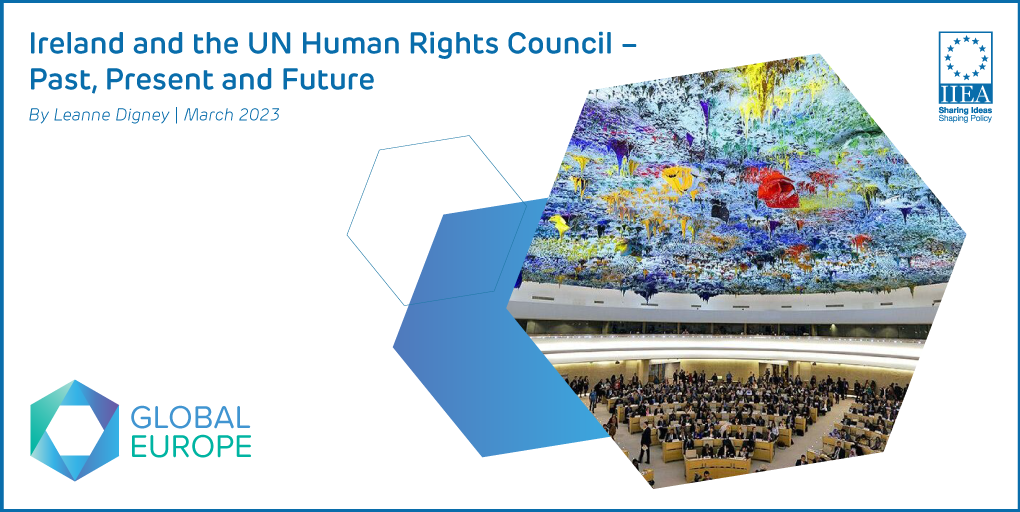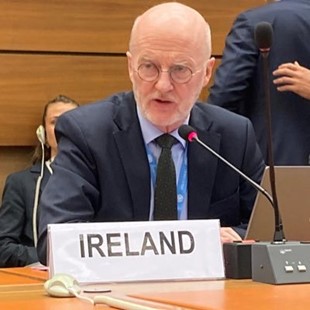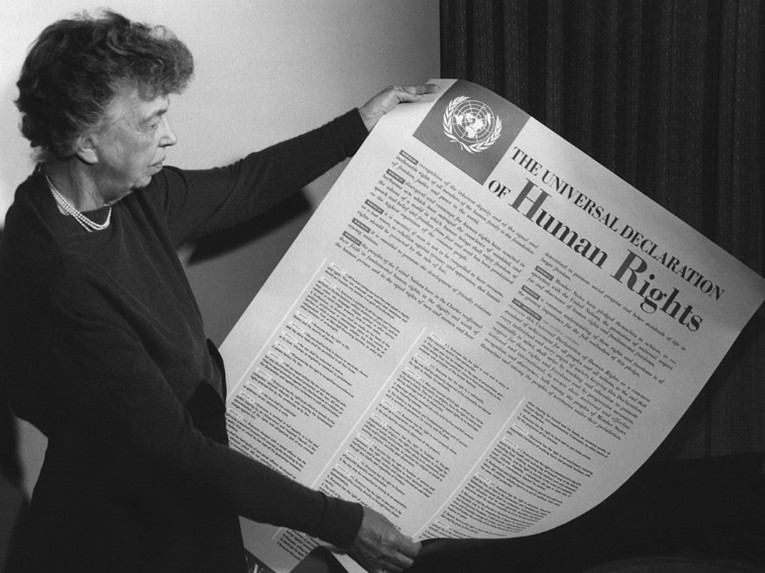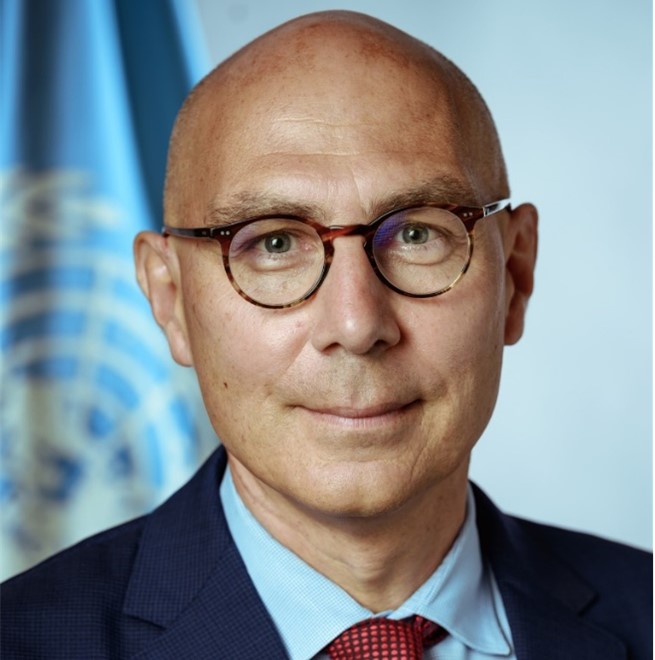Ireland and the UN Human Rights Council – Past, Present and Future

In February 2023, during an address to the 52nd Session of the Human Rights Council in the Palais des Nations in Geneva, an Tánaiste, Micheál Martin, announced Ireland’s candidature for membership of the United Nations Human Rights Council for 2027-2029. This announcement is particularly significant in a year which celebrates the 25th anniversary of the UN Declaration on Human Rights.
The UN Human Rights Council (HRC) was established in 2006 and is responsible for strengthening the promotion and protection of human rights worldwide within the UN system.[1] The Council meets three times a year in Geneva and is composed of 47 States. Members are elected for staggered three-year terms by the UN General Assembly.[2]

Tánaiste Micheál Martin TD, Minister for Foreign Affairs and Minister for Defence
In his address, Tánaiste Micheál Martin emphasised that “there is no better time to remind ourselves of the principles of universality, inalienability, indivisibility and interdependence of human rights.” He emphasised that respect for human rights and accountability for human rights violations have always been a cornerstone of Irish foreign policy. This commitment to human rights has been exemplified throughout Ireland’s recent tenure as an elected member of the UN Security Council (2021-2022), but also during its previous membership of the UN Human Rights Council (HRC).
Ireland was elected to serve as a member of the HRC for the first time in November 2012. The hard-fought election represented a major endorsement of Ireland’s foreign policy in the area of international human rights advocacy across the globe. During its three-year term, which lasted from 1 January 2013 to 31 December 2015, Ireland worked extensively on human rights issues including freedom of religion or belief, support for human rights defenders, rights of the child, the death penalty, gender equality, and the rights of LGBTI+ persons. Ireland led the drafting and negotiating of Human Rights Council resolutions on the importance of free speech and free association and called on States to create and maintain safe spaces for civil society groups to act. During its time on the HRC, Ireland also participated in reviews of the human rights situation in 119 countries and made 240 recommendations, almost 70% of which were accepted.[3] Ireland is represented in Geneva by the Permanent Mission of Ireland to the UN. Currently, the Mission is headed by H.E. Noel White, the Ambassador of Ireland to the United Nations and other International Organisations in Geneva. [4]

H.E. Noel White, Permanent Representative of Ireland to the United Nations
“We stand today at the threshold of a great event both in the life of the United Nations and in the life of mankind. This declaration may well become the international Magna Carta for all men everywhere”. These were the words with which Eleanor Roosevelt submitted the UDHR to the UN General Assembly in 1948.[5] While the UDHR is not a binding document, the General Assembly proclaimed in the Preamble that the Declaration is a “common standard of achievement for all peoples and all nations.”[6]

Eleanor Roosevelt,
Chairperson of the drafting committee of the Universal Declaration of Human Rights
Each year on 10 December, Human Rights Day is observed by the international community to commemorate the adoption of the Universal Declaration of Human Rights (UDHR). This year in 2023, the Office of the High Commissioner for Human Rights is leading a year-long campaign to promote and recognise the 75th anniversary under the theme of: “Dignity, Freedom and Human Rights for All”. The office is headed by Mr. Volker Türk who is the current United Nations High Commissioner for Human Rights, who took up his official functions as High Commissioner on 17 October 2022.
Speaking at the opening of the 52nd session of the Human Rights Council in Geneva, UN High Commissioner for Human Rights, Volker Türk, urged States to “rekindle the spirit, the impulse and the vitality that led to the adoption of the Universal Declaration of Human Rights 75 years ago.”

Volker Türk, United Nations High Commissioner for Human Rights
In his speech to the Human Rights Council, an Tánaiste strongly condemned Russia’s war of aggression and reminded the international community that the invasion is “not only an assault on Ukraine’s sovereignty and territorial integrity, it is an assault on the rules-based international order and multilateralism itself.” He referenced further worrying trends which are threatening human rights across all regions, notably shrinking civil society space, attacks against Human Rights Defenders, pervasive violence against women and girls, and climate change. Acknowledging that the Human Rights Council has in recent years taken principled action to respond to human rights crises in Ukraine, Iran, Nicaragua, Afghanistan¸ Sudan and Ethiopia, amongst others, he recognised that in a number of countries we continue to witness “the tragic impact of conflict resulting in human rights abuses and violations of the most vulnerable”, and expressed regret that there is not currently a mandate for the HRC to monitor the human rights situation in Yemen.
An Tánaiste expressed deep concern about the pressure being exerted against civil society and recognised that civil society actors and human rights defenders are being targeted and prevented from carrying out their work worldwide, including in Russia, Algeria, Cambodia and Iran.[7] He further underlined the essential role that civil society organisations play in promoting international law, peace, human rights and democratic values. Ireland is a long-standing champion of the role of civil society and during its Presidency of the UN Security Council in September 2021, Ireland brought the voices of 16 women civil society briefers to the Council table - a record number for any Council Presidency to date.[8]
In response to the many challenges to international human rights, Ireland is now seeking membership of the Human Rights Council for the period 2027-2029 and has reaffirmed its commitment to being a strong voice, championing human rights and fundamental freedoms for all persons without distinction based on nationality, place of residence, gender, national or ethnic origin, religion, language, or any other status.
[1] United Nations Human Rights Council https://www.ohchr.org/en/hr-bodies/hrc/about-council#:~:text=The%20Human%20Rights%20Council%20is,and%20make%20recommendations%20on%20them.
[2] The Council is mandated, among other things, to address violations of human rights and human rights emergencies, make recommendations to the UN General Assembly in relation to international human rights law, promote the full implementation of human rights obligations undertaken by States and undertake a Universal Periodic Review (UPR) of the fulfilment by each of the 193 UN Member States of its human rights obligations.
[3] Year in Review 2015, Ireland’s Membership of the Human Rights Council (2013-2015) https://www.dfa.ie/annualreport/2015/our-values/ireland-membership-human-rights-council/
[4] The International Organisations in Geneva including; Conference on Disarmament; The International Federation of Red Cross and Red Crescent Societies (IFRC); the International Organization for Migration (IOM); the International Labour Organization (ILO); the International Telecommunications Union (ITU); the Joint United Nations Programme on HIV/AIDS (UNAIDS); the World Intellectual Property Organization (WIPO); the United Nations Conference on Trade and Development (UNCTAD); the World Health Organization (WHO); the World Metrological Organisation (WMO); the United Nations Office for the Coordination of Humanitarian Affairs (UNOCHA); the World Trade Organization (WTO).
[5] United Nations Foundation, How One Woman Changed Human Rights History, https://unfoundation.org/blog/post/how-one-woman-changed-human-rights-history/
[6] Preamble, Universal Declaration of Human Rights, https://www.un.org/en/about-us/universal-declaration-of-human-rights#:~:text=All%20human%20beings%20are%20born,in%20a%20spirit%20of%20brotherhood.
[7] Statement by Tánaiste Micheál Martin at the 52nd session of the Human Rights Council, https://www.dfa.ie/news-and-media/press-releases/press-release-archive/2023/february/statement-by-tanaiste-micheal-martin-at-the-52nd-session-of-the-human-rights-council.php
[8] IIEA Seminar: Ireland on the UN Security Council - Statement by Minister Simon Coveney, https://www.gov.ie/en/speech/142e9-iiea-seminar-ireland-on-the-un-security-council-statement-by-minister-simon-coveney/
